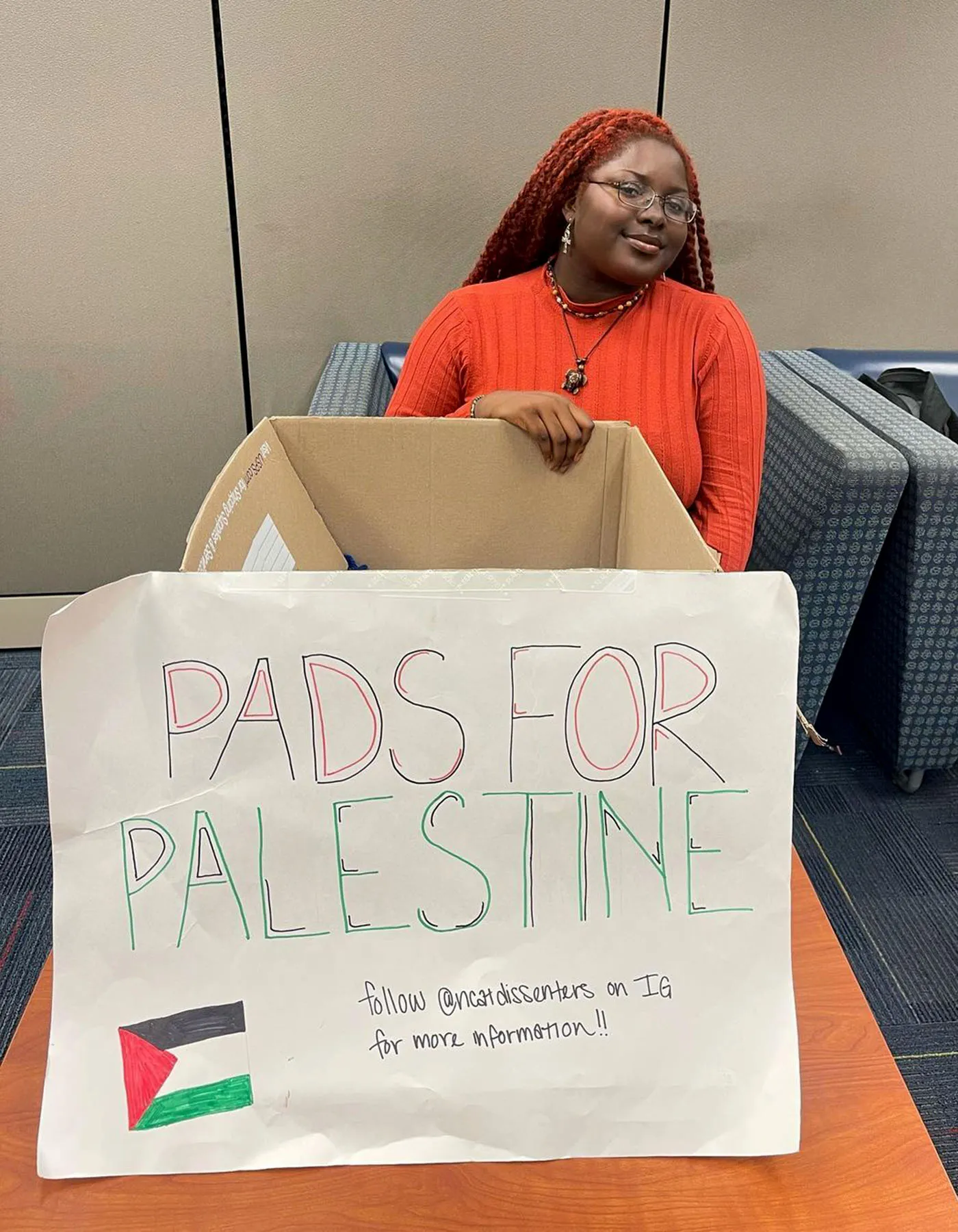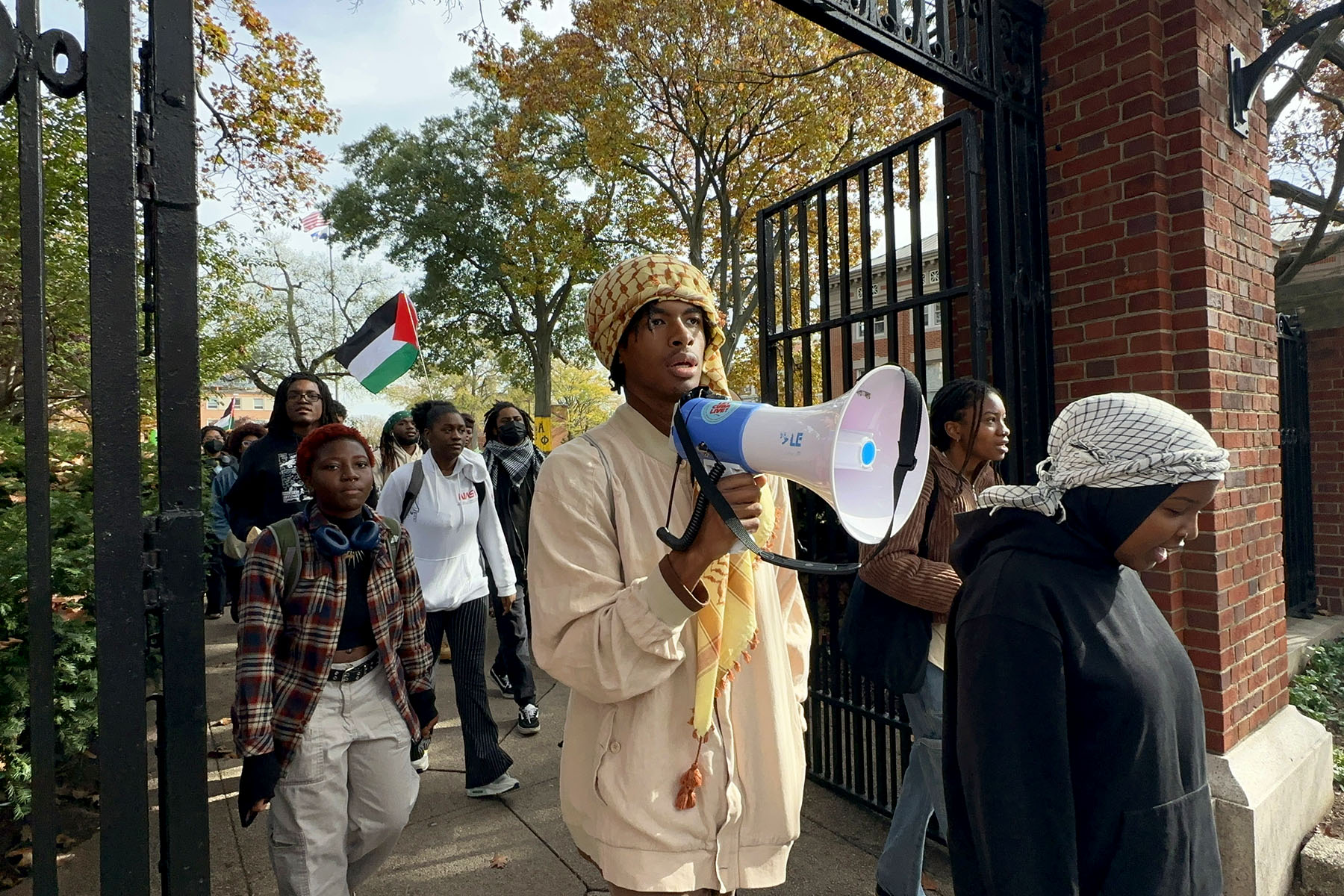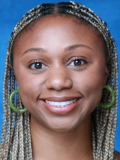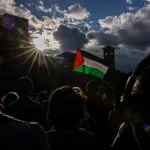Editor’s note: This article has been updated to include a response from North Carolina A&T.
This piece was published in partnership with In These Times.
If you step foot on a historically Black campus or university (HBCU) this week, you might see “Black Voters Matter” signs wedged in the grass or groups of students shuffling to and from class with “I voted” stickers affixed to their shirts.
But while this election has drawn many HBCU students to the polls, some are choosing not to vote in the presidential race in the name of Palestinian solidarity.
Student activist Ziora Ajeroh, a senior at North Carolina A&T State University in Greensboro, is one of them.
“I’m not seeing or have not been seeing what I need from Kamala Harris to convince me to vote for her,” Ajeroh said. “And she’s funded the occupation and genocide of Palestine.”
None of the students interviewed said they considered voting for former President Donald Trump, who has positioned himself as a strong supporter of Israeli Prime Minister Benjamin Netanyahu and criticized calls for a ceasefire.
Since Hamas killed 1,200 Israelis and took 238 hostages on October 7, 2023, Israel has destroyed 60 percent of Gaza and, according to Gaza’s Ministry of Health, killed more than 43,000 Palestinians (with some estimates putting the death toll much higher). Meanwhile, the United States spent at least $17.9 billion in military aid to Israel between October 7, 2023 and September 30, 2024, according to the Cost of War Project by the Watson Institute at Brown University,
In response, college students like Ajeroh have been making waves through protests, encampments, divestment campaigns, nationwide walkouts from class and resource drives.
Ajeroh started North Carolina A&T’s first on-campus chapter of Dissenters, an anti-war youth organization, in October 2023. The student organizers have since held discussions on Palestinian liberation, collected menstrual products for Palestinians and led campus-wide marches for a ceasefire.
Now, they are facing a highly charged voting decision. “I think we should explore the idea of abstaining from elections or withholding our vote until our needs are met,” Ajeroh said. “We just acquiesce too quickly, and a lot of us need to understand the power of our vote and the power of withholding it.”
Amel Mohdali, a sophomore at Spelman College, an all-women’s HBCU in Atlanta, is also active in the movement for a free Palestine and chose to cast a ballot for president. She voted early this week.
“I’m voting because … we’re not just voting for us,” Mohdali told In These Times and The 19th. “Black voters bear the burden of a lot of things because we’re fighting for a broader movement toward equity, human rights and liberation.”
As a first-time voter, Mohdali said she left the ballot box feeling disappointed that her vote was determined by the same moral dilemma that many Americans faced in 2020: a choice between the lesser of two evils, with democracy at stake.
Vote. ‘See how the country will change for the better’
More than 40 million Gen Z Americans are eligible to vote in the 2024 election and one of their top voting issues is the war in Gaza, according to a national poll of young voters by GenForward.
With youth of color making up nearly half of newly eligible voters in this election, the vote of HBCU students could be a powerful factor in swing states like Georgia and North Carolina, where Mohdali and Ajeroh live, respectively.
“People fail to realize that the HBCU or young Black vote is rooted in historical struggles for justice and equality,” Mohdali said. “Our vote carries the weight of resisting systemic issues and advocating for policies that directly affect us as communities from education and health care to social justice reform. But it’s about more than just us being informed on our own issues. It is also about knowing global issues and helping marginalized communities across the globe.”
Before Vice President Harris became the Democratic nominee in August, President Joe Biden struggled with young voters amid overwhelming youth support for a ceasefire.
During 2023, students at the three HBCUs in Atlanta organized as the Atlanta University Center Consortium (AUCC) — Clark Atlanta University, Spelman College and Morehouse College — rallied together and formed AUCC Students for Justice in Palestine, a chapter organization highlighting Black and Palestinian liberation. The student organization, along with many others throughout the nation, demanded that Biden stop military aid to Israel and force an immediate ceasefire.
His failure to do so resulted in nationwide class walkouts and encampments across college campuses.
In the spring of 2024, groups of students at predominantly White institutions like Columbia University and the University of Southern California peacefully camped out on the lawns of their campuses in protest of the war in Gaza. Many experienced a heavy police response that included rubber bullets, tear gas and even arrests. HBCU campuses largely did not participate in encampment efforts.
Ajeroh said students at North Carolina A&T didn’t camp out in protest because of intimidation tactics that the university police department started inflicting on student activists, including confronting students about their work with the Dissenters chapter and breaking up pro-Palestinian organizing spaces. Ajeroh says she felt cornered. (The North Carolina A&T police department has not responded to a request for comment.)
According to university spokesperson Jackie Torok, North Carolina A&T Interim Police Chief Jack Moorman disputes these allegations.
“University police have provided security for students who have organized protests on campus in support of Palestine, specifically on May 3, 2024, and October 25, 2023,” Torok said. “N.C. A&T has been held up as a model for how to handle protests with respect and positive engagement so that students can make their voices heard.”
“HBCUs have this history of trying to quench radical political activity through strong-arm threats and rules and regulations that prevent students from gathering,” Ajeroh said. “When that is the culture of HBCUs, of course, nobody is going to think, ‘Let’s start an encampment.’”
While HBCUs have a national reputation for being politically active campuses, respectability politics have historically played a role in how administrations across Black institutions silence students to maintain a status quo.
In Georgia, Mohdali said students’ pro-Palestinian efforts across the AUCC were met with resistance from the administration. She says the Spelman administration threatened students with expulsion. (Reached for comment, a Spelman College spokesperson expressed the institution’s support for peaceful protest while providing “a safe space for our campus community to engage in open dialogue, where all perspectives can be heard in an environment free from intimidation, harassment, or violence.”)
“Activism felt like a struggle against the silencing and repression of our voices,” Mohdali said.
Morehouse, an all-men HBCU, invited Biden to deliver the college’s commencement speech in May and overruled objections by students and alumni concerned with his presence on campus because of the war in Gaza.
When Biden spoke at the graduation, students wore Palestinian flags and keffiyehs, and several turned their backs on him or raised fists in protest.
After Biden announced he would end his bid for the presidency, the attitudes of many young voters shifted toward enthusiasm for Harris. At Spelman, Mohdali saw students begin to envision a future with a Black and South Asian American woman as president and decide to vote.
As the daughter of an immigrant, Mohdali says she has always wanted to see a woman who looked like her and graduated from an HBCU — Harris is an alumna of Howard University in Washington, D.C. — in a position of power like that of the president.
“We’re conditioned as Black and Brown children to believe we have to be in these [White-dominated] spaces to achieve success, [and] that’s where Kamala is going to be if she wins this election, so I have a heavy amount of pride in seeing her in such a position,” Mohdali said. But that pride is not unadulterated. “I’m also looking at everything else she’s been doing with Palestine and I feel like there’s a lack of care, especially since she’s the daughter of immigrants. It seems like she doesn’t really care about immigrants or refugees.”
Across Spelman, Mohdali said campaigns and slogans like “Vote Blue,” “Trust Black Women” or “Vote Blue because reproductive health is on the line” abound, even though the institution is nonpartisan. She feels these signs have contributed to a sense that students, faculty and administration must turn out for Harris.
“We are a heavily liberal campus, so everybody knows that we have to vote for Kamala and that Kamala is the only way,” Mohdali said.
This sentiment is often true for many Black institutions when Black leaders are placed in positions of political power, but what angers and disappoints Mohdali is when that power is misused. She said that the Biden-Harris administration failed to listen to students like her across the country advocating for the movement for a free Palestine and to stop funding Israel.
Nevertheless, she believes that voting is the best way to wield influence. “As we are witnessing genocides across the globe and watching our involvement in them, I would like to hope that Kamala could bring in a new age,” Mohdali said. “If not, I feel like the next best thing is organizing your communities and advocating for policy changes.”
This fall, Mohdali and students across Spelman continue to organize for Palestinian liberation, rallying students around it and other global issues, like the displacement of Sudanese people by the brutal civil war and the ongoing postcolonial conflict in Congo.
This Black and Palestinian solidarity work has also extended to voter education, with students like Mohdali at the helm. Mohdali is on the executive board of Spelman College Fair Fight U, former state Rep. Stacey Abrams’ student voting rights chapter. She has been informing students of Georgia’s importance in this election as a swing state.
“It would take half of the AUCC to turn this state blue. That’s all we need! We know that Atlanta carries weight, but at the same time if we’re not going out and voting, we don’t really hold any power,” Mohdali said.

Not voting. ‘A win for her is not a win for us’
In this presidential election, North Carolina also holds the power of a swing state that could determine the outcome of the presidential race. This has drawn many young first-time voters out to the polls in early voting.
Ajeroh said she saw the voting apprehension that existed when Biden was at the top of the Democratic ticket disappear once Harris was the nominee. The once-shared consensus among some students engaged in pro-Palestinian activism to abstain from voting in this election quickly changed, she said.
For Ajeroh, the Israeli occupation of Palestine remains top of mind when it comes to her presidential vote. She feels that if enough people withhold their vote, it could send a sign to Harris that what the United Nations has found reasonable grounds to call genocide in Gaza is a hard line for them, forcing the vice president to make it a priority.
“It’s important for her to win over this state, but she hasn’t won me over and there’s power in that,” Ajeroh said. “Our votes, or lack thereof, have the power to potentially determine the election.”
The Biden-Harris administration’s inability to accomplish a ceasefire, what she sees as a dismissive demeanor toward the Palestinian plight and financially providing military aid to Israel are all reasons Ajeroh won’t be voting for Harris.
Regardless of her reasoning, Ajeroh says she has been shamed by several liberal students on campus for her decision. That stings when she has spent the last four years advocating for the power of student voices by building a political home on North Carolina A&T’s campus for students who care about anti-war efforts.
“A lot of people are only politically engaged during election season but have a lot to say about who does and does not have political power,” Ajeroh said. “Them casting their vote and disengaging from politics every four years is more surrendering of political power than people choosing not to vote.”
As a student and organizer, Ajeroh works to dismantle a common mentality she sees on campus when it comes to global issues.
“People are saying, ‘It’s us versus them,’ and that they’re choosing us even though they feel bad for them. That’s unfortunate because, in parts of this country, we are still them,” she said, referring to the Palestinian people.
She argues that if people care about reproductive rights and feminist issues then they should care about what’s happening in Gaza, especially since more than 90 percent of pregnant and breastfeeding women in Gaza face severe food poverty, less than 17 hospitals are functioning, close to 180 women give birth every day and more than half of the Palestinians killed have been women and children, according to the Palestinian Health Ministry.
“If you care about health care, women, children, people of color or our rights, then all of these issues are intertwined and at risk for us, too,” she says.
Harris being a Howard graduate and holding some of the same shared identities as many HBCU students was enough to convince many young Black students to get behind a Harris ticket.
But none of those things mattered to Ajeroh.
“I’m not proud to have a woman of color sitting in a position of imperial power, especially when the actions of the United States are impacting South Asian, Black women and people of color abroad,” Ajeroh said. “It doesn’t do anything for us. A win for her is not a win for us.”





